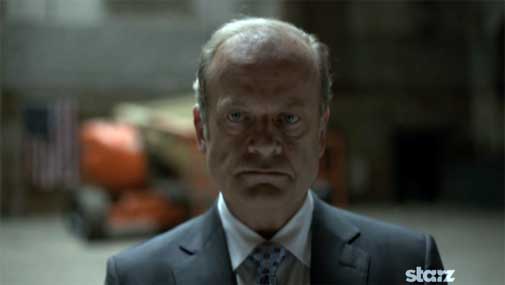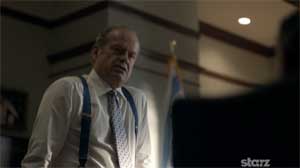
The impressive first scene of Boss, the new Starz drama starring Kelsey Grammer as a volatile and domineering Chicago mayor, locks in entirely on Grammer's Tom Kane as (seen above) he receives a death sentence from his doctor -- a long, dispassionate description of the probable effects, short-term and long-term, of his rare brain disease.
Immediately following comes the clunky second scene, in which Kane quotes something obscure, the doctor recognizes the reference, and the whole exchange calls attention to itself as something written rather than lived. And that's the problem with Boss, at least at first. One scene works, but the next one doesn't...
In the series premiere of Boss (10 p.m. ET, Starz), the choices made by series creator Farhad Safinia, a co-writer of Apocalypto, are almost self-consciously grandiose. Start with the leading character, a ruthless and powerful man, being named Kane. Perhaps it wasn't meant to intentionally evoke Orson Welles' publishing magnate in Citizen Kane -- but my guess is that it was.
Just as, I suspect, Kane's cold-as-nails, cutting-as-knives wife, played by Connie Nielsen, is a modern evocation of Lady Macbeth, and Kane himself is a modern King Lear. He even has an estranged grown daughter, played by Hannah Ware, just as Lear did. And boy, does Boss want to be Shakespearean. There are Iagos all over the place, plotting their plots, making their moves and scheming their schemes.

Except, instead of doing it covertly, they all dive into everything headlong, and quickly --announcing or revealing their intentions quickly. Even Kathleen Robertson, as one of Kane's loyal aides, throws herself into a dangerous sex-in-public-spaces affair with a vigor, and a disregard for consequences and credibility, that, as evening liaisons and behaviors go, is less sensible after hours than Cinemax After Dark.
Even the music of Erik Satie is overused in the premiere -- employed beautifully the first time, too obviously in the second. And that's the way Boss flows, at least in the first two episodes. One step forward, two stumbles back.
The direction by Gus Van Sant is full of nice visual flourishes. The extended closeup that opens the show, the occasional extreme closeups of Kane's eye or fingers, the many scenes shot from below to accentuate Kane's imposing figure and power -- all of it adds to the drama.

So does Grammer, whose shift away from the comedy of Frasier and Cheers works well. As a politician, he's comfortably believable, whether giving a speech, venting about the latest behind-the-scenes problems, or trying fumblingly to connect with members of his family and come to terms with his own illness.
But the writing has got to improve for Boss to soar. In that opening scene where Kane gets the diagnosis from his doctor, their exchange takes place in an abandoned factory in Chicago. There could have been hundreds of other places to meet discreetly, but Kane wanted it to be in a former slaughterhouse -- and, more precisely, on the killing floor, as it was branded in the famous muckraking account by author Upton Sinclair.
Maybe that alone, would have been subtle enough to work. But then, after getting the bad news and ushering the doctor outside, Kane utters a long, uncredited quote. And the doctor recognizes it as something from the author of The Killing Floor, whose expose came out more than 100 years ago. "Sinclair," she says knowingly.
"Unbelievable," I think disappointingly.
But there's hope. Many cable dramas take a while to find their way -- and the more into Kane's disease Boss progresses, the more interesting it may be, with hallucinations mingling with reality, and with viewers not always privy to the distinction.
The danger, though, is that by then, viewers may not care.